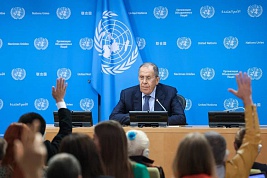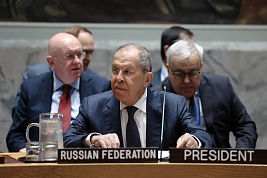Comment by the Information and Press Department on the main results of the OSCE Ministerial Council meeting in Basel
Amid the European security crisis and the conflict in Ukraine, the ministerial meeting reaffirmed the role of the OSCE as an important forum for political dialogue on current Europe-wide problems. The OSCE's Swiss chairmanship organised an interactive discussion of ways to resolve the European security crisis, and the threats posed by international terrorism and the Islamic State. Despite the clearly politicised rhetoric employed by some countries to mask their own gross violations of the Helsinki principles, the discussion of these issues was generally useful.
In Basel, the Ministerial Council also effectively performed its functions as the central decision-making and governing body of the OSCE, adopting an impressive array of documents that set goals for the future.
The main political document at the meeting was the declaration on further steps within the framework of the Helsinki+40 Process. It announced the creation of the Panel of Eminent Persons on European Security Issues with representatives of key OSCE countries, including Russia. We expect that these efforts will help restore and build confidence in the European region.
On the initiative of Russia and other OSCE countries, the Basel meeting adopted a declaration on the 70th anniversary of the end of World War II. We advocate the preservation of the historical truth about this tragedy of the 20th century, and are committed to counter attempts to revise the results of the war and resurrect Nazi ideology.
One important outcome of the Ministerial Council meeting was the transfer of ownership to the parties to the Agreement on Subregional Arms Control, Annex 1-B, Article IV of the General Framework Agreement for Peace in Bosnia and Herzegovina. As one of the guarantors of the Dayton Peace Agreements, Russia hopes that this step will help consolidate peace in the Balkans and enhance the responsibility of countries in the region for that process.
We welcome the decisions that the Ministerial Council in Basel took on the security dimension. We hope that the documents on countering foreign militants and terrorists, abductions and hostage taking by terrorist groups will contribute to strengthening the OSCE's anti-terrorist capability. We note the decisions on small arms and light weapons, stockpiles of conventional weapons, and the 20th anniversary of the OSCE Code of Conduct on Politico-Military Aspects of Security. We regret that, due to the unconstructive position of certain countries, a decision on the procedure for one of the OSCE's decision-making bodies, the Forum for Security Cooperation, was not approved for the third time in succession.
We are satisfied with the OSCE's work on the economic and environmental dimensions, which resulted in decisions at the Basel meeting on reducing the risks of natural and man-made disasters and combatting corruption. A statement by the CSTO foreign ministers on the harmonisation of integration processes in the European region contributed to the Ministerial Council's work.
Russia participated in the drafting of ministerial decisions on the OSCE's human dimension in keeping with its traditionally constructive role. We are satisfied with the adoption of documents on work with youth and children, combatting violence against women, countering anti-Semitism, and the start of the implementation of the OSCE's Action Plan for the Promotion of Gender Equality.
We take note of the documents on regional issues that were adopted at the Ministerial Council, including a statement on the Transnistrian settlement and the joint statement on Nagorno-Karabakh by the delegation heads of the OSCE Minsk Group Co-Chair Countries: Russia, France and the US. The declarations on cooperation with the OSCE's Asian and Mediterranean partners, which in particular noted the importance of combatting Christianophobia, merit special attention. We expect a separate OSCE conference on the issue to be held in 2015.
It is regrettable that during the preparations for the Ministerial Council meeting in Basel, no consensus was reached on a number of documents, including several Russian initiatives. This refers to draft decisions on the unacceptability of anti-constitutional coups and the fight against neo-Nazism and statelessness. These issues will remain among Russia's priorities, which we will continue to promote at the OSCE.
The ministerial meeting in Basel reaffirmed the growing demand for the OSCE in international affairs. The plans of those who sought to isolate Russia have fallen through. This was evident from the interactive discussion with Russian participation, as well as the roughly 20 bilateral meetings Sergey Lavrov had on the sidelines of the Ministerial Council. It is noteworthy that the events in Ukraine did not have a significant impact on the OSCE's current agenda, as shown by the broad array of documents adopted on all of the Organisation's three dimensions.
In 2015, the OSCE chairmanship in office will go to Serbia and in 2016 and 2017, to Germany and Austria, respectively. We wish our Serbian, German and Austrian colleagues successes in this post and count on their balanced and objective approach in accordance with the chairmanship mandate. For our part, we intend to support the OSCE's efforts to overcome crises and build confidence in the European region.


